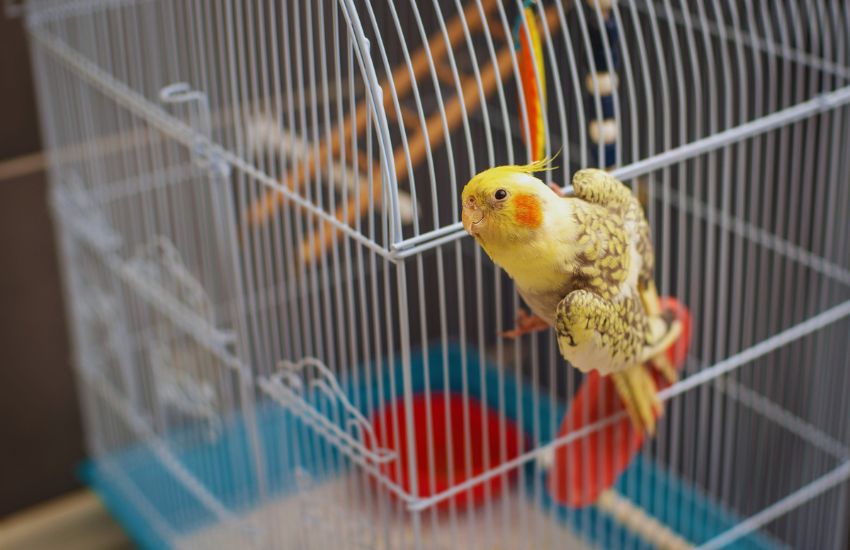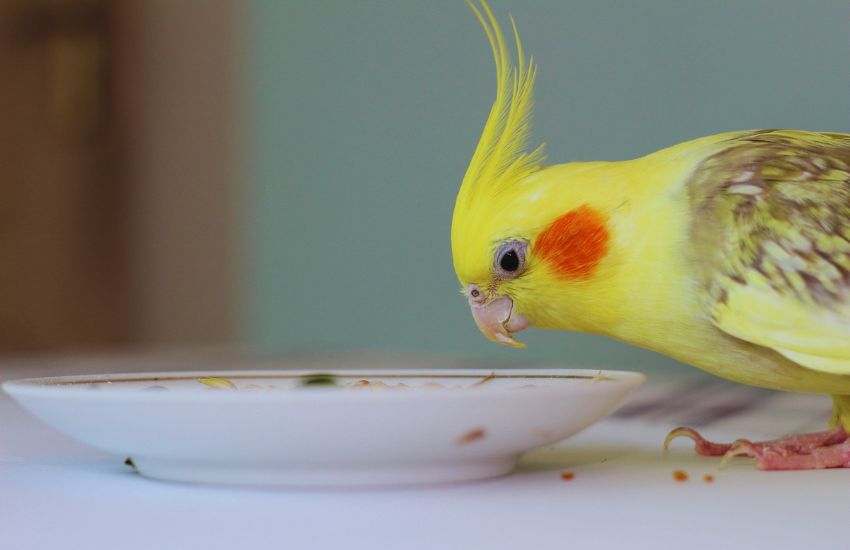shelter pets in need
Each order helps pets in need

Is there any bird that puts a smile on your face quicker than the perky little cockatiel? What's more irresistible than that cute yellow face with the bright orange cheek feathers, topped by a jaunty crest? Yes, we're pretty much obsessed with the charming cockatiel.
If you are already owned by one, you know what we're talking about. If not, here are some facts about this bird species to get you started.
The cockatiel is originally from Australia, first discovered by Westerners in 1770, becoming a popular pet in the 1900s during the Australian gold rush. They are also one of the parrot species in the cockatoo family. Their scientific name is Nymphicus hollandicus, named by the explorers who "discovered" them and compared the experience to seeing little nymphs.
Cockatiels are very social creatures and form incredibly close bonds with their owners. They see you as their mate, best friend, and source of entertainment all rolled into one. Be prepared for lots of whistling, chirping, and even the occasional serenade when you're around. Who needs a boombox when you've got your own feathered troubadour?
Pet cockatiels do not like being left alone for extended periods. Pet owners must get a pair if they are away from home often.

Cockatiels are active birds and need a spacious cage. We recommend getting the largest cage you can afford and fit in your home—something around 18 inches high by 18 inches wide suits a single cockatiel.
Place the cage in an area with lots of natural light, like near a window. Cockatiels need 10-12 hours of daylight per day. Avoid direct sunlight, though, as it can overheat the cage. An ideal spot is near an east- or west-facing window.
You'll want multiple perches at different levels in the cage so your cockatiel can move around. Include some toys to keep them entertained when alone, such as swings, ropes, and puzzle toys with treats. Be sure any toys are bird-safe.
Cockatiels are natural-born entertainers. Not only are they adorable, fluffy balls of energy, but they are also talented vocalists. Their vocal skills know no bounds.
These birds can mimic human speech and pick up phrases they frequently hear, so watch what you say around them! You never know when your cockatiel might start repeating that hilarious joke or witty comeback at the most inopportune moment.
Teflon and other non-stick coatings release toxic fumes when overheated, which can be deadly to your cockatiel. Never let Teflon or other non-stick-coated pans, pots, or appliances overheat around your bird. The fumes from an overheated Teflon pan can harm your bird.
Ensure to ventilate the area well by opening windows and using an exhaust fan. Never leave your cockatiel unattended in the kitchen when the stove or oven is used. It's always better to be safe than sorry to keep your feathered friend healthy and happy.
Cockatiels are natural-born entertainers and love putting on a show for their owners. With patience and positive reinforcement training, you can teach your cockatiel all sorts of tricks and stunts.
Teaching your cockatiel to roll over is a fun trick, even if it serves no real purpose. Start by having your cockatiel do a simple spin while giving the command, "Roll over!" Reward with a treat and praise. Once your cockatiel has mastered the spin, hold the treat slightly to the side so they have to tilt to reach it.
Over multiple training sessions, hold the treat progressively lower and off to the side until your cockatiel has to roll onto its back to get it. Voila—you now have a cockatiel that can roll over on command!
If you want to impress your friends, teach your cockatiel to jump through a hoop. Start with the hoop resting on the ground, giving the "jump!" command and pointing at the hoop. When your cockatiel hops through, shower them with treats and praise. Slowly lift the hoop a little higher off the ground in each session.
It can take weeks of regular practice for a cockatiel to master jumping through a hoop at full height while flying, so patience and persistence pay off.
Teach your cockatiel to give kisses on command for the ultimate cute trick. Hold your finger or cheek and say, "Give us a kiss!" If your cockatiel nibbles or rubs against you, immediately reward the behavior. Over time, only give the treat when you feel their beak touch your skin.
Once your cockatiel associates the command and behavior with getting a reward, you'll have a cockatiel that gives kisses! How adorable is that?
With regular practice and positive reinforcement, your cockatiel can become quite the little entertainer. These social and intelligent birds thrive on learning and engaging with their owners. Teaching tricks is a great way to bond and stimulate your cockatiel mentally.
Twenty-five years is a long time—long enough to go through several presidents, see technology advance in unfathomable ways, and watch your hairline recede at an alarming rate. But 25 years with a cockatiel? That's a lifetime of laughter, whistles, and feathered friendship.

Enjoyed these fun cockatiel facts and want to see more enchanting birds? Check out 10 Adorable Bird Pictures to Make You Smile!
Your Animal Hearted purchase saves lives! 25% of all proceeds are donated to no-kill animal shelters!
Well, that depends on your definition of "a lot." Cockatiels can bite but usually only if they feel threatened or are protecting their territory (or mate). As social creatures, cockatiels prefer resolving issues through loud squawking rather than biting. That said, an untamed cockatiel may give you a nip if you stick your finger in its face or cage uninvited.
Cockatiels can make wonderful lifelong companions if you're looking for an affectionate, social, and intelligent pet bird. However, cockatiels need daily interaction and mental stimulation, or they can become bored, noisy, or destructive.
Cockatiels have a long lifespan, so they are a long-term commitment. If you travel frequently or have an unpredictable schedule, a cockatiel may not be the right pet for you. But for those willing to put in the time to properly care for and bond with a cockatiel, they can be endlessly entertaining and endearing pets.
The key to a long, healthy life for your cockatiel pal is providing the proper diet, environment, mental stimulation, and veterinary care. Feed your cockatiel a balanced, pelleted diet as the central part of its food, limit seeds to no more than 10% of its intake, and offer fresh veggies, fruits, and the occasional millet spray.
House your cockatiel in a large cage in a spot that gets lots of natural light and ambient noise, and be sure to give it multiple hours of interaction and playtime outside its cage daily. Take your cockatiel for regular checkups with an avian vet, and watch for any signs of illness or distress.
By meeting all your cockatiel's needs, you'll have a happy, thriving companion for many years.
Leave a comment